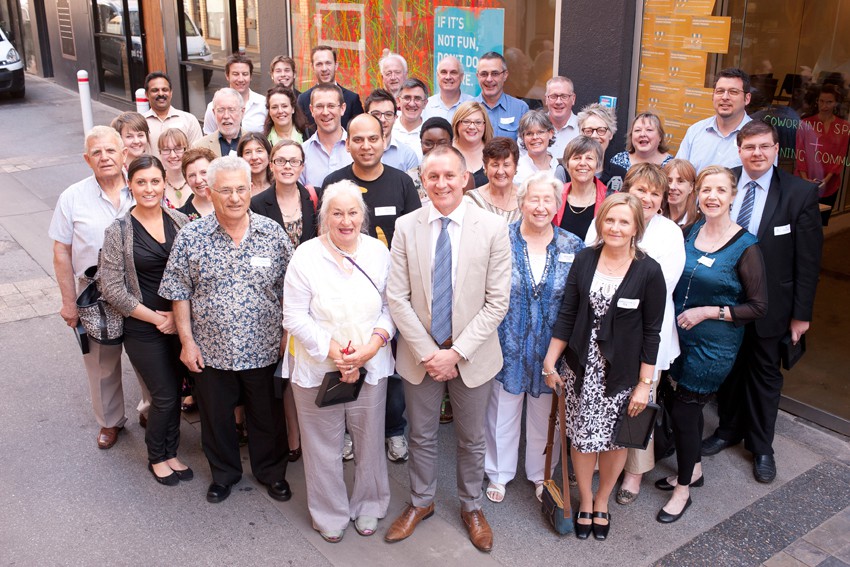The Worst Form Of Government

Voting has become a low-involvement consumer product focused on catch phrases and effective advertising.
On being booted out of government after leading the UK to victory in World War Two, Winston Churchill proclaimed democracy the worst form of government, “except for all those other forms that have been tried from time to time”. A 2012 Lowy Institute survey of young Australians found that only 39 percent of the 18 to 29 year-olds questioned believed democracy to be the best political system, while a shrinking voter turnout at federal and state elections seems to support the view that Australians are losing faith, or at least losing interest in political engagement. According to the Sydney-based newDemocracy Foundation, voting has become a low-involvement consumer product focused on catch phrases and effective advertising. Our electoral system rewards election-focused behaviour rather than substantive policy detail, making it difficult for the party in office to successfully govern. Parties of all persuasions are beginning to manufacture their differences, as ideologies evaporate and the political contest devolves into the worst form of populism. Inspired by a similar initiative in Oregon, the newDemocracy Foundation is researching alternative processes that might replace adversarial attack with informed deliberation. The aim is to move government out of a continuous campaign cycle, and to reinstate trust in political decision-making, in a cynical electorate who believe powerful industry and union lobbyists rule the day. Foundation Director Iain Walker points to the one institutional model which continues to instill trust, satisfy political representation and promote dialogue and consensus: The modern criminal jury is a profoundly democratic and egalitarian institution that operates on the principle that all persons selected are fundamentally equal. Random selection also prevents corruption of the system. The concept of a “citizen’s jury” thus relies on a deliberative decision-making process based on the random selection of a demographically representative group of people, and a structure in which those people can acquire information and find common ground, with a clear understanding of the path to authority. Walker was hired by the Weatherill government to give a jury of 43 randomly-selected South Australians the task of exploring how Adelaide can achieve a vibrant and safe nightlife. The jurors addressed their charge by focusing on the areas of commerce, infrastructure, alcohol licensing, transport, health, education and entertainment. Over five Saturdays at three-weekly intervals they considered numerous submissions, heard from local and interstate experts, and shared their own knowledge, experience and research to come up with a 15 page report containing seven recommendations that were delivered directly to the Premier, and which will be considered (unadulterated) by Cabinet and the Parliament. The release of the report in October coincided with the implementation of the government’s new Late Night Code of Practice, which introduced a 3am lockout for licensed venues, along with a suite of other measures aimed at curbing alcohol-related incidents of abuse and violence on the city’s streets. The report also came some nine months after the government’s other key policy initiative in this area, namely the introduction of new laws to make it easier for people to start small bars in the CBD. While it may seem, in this instance, that the implementation of policy couldn’t wait for the people’s verdict, the scope of the citizen jury’s report went beyond the confines of alcohol licensing. The general consensus was that Adelaide nightlife is already vibrant and safe when compared with similar cities interstate and overseas, but that the city would benefit from a number of initiatives. The jurors felt that a single central source of “what’s on” information would be useful. They also supported an awareness campaign about what the CBD has to offer, and the facilitation of activities, events and evening trading opportunities that don’t require alcohol consumption. Improvements to public transport, and pedestrian-friendly and bike-friendly initiatives were a high priority, although there was also recognition of the role of private transport, with a suggestion that car parking be subsidized in some instances to encourage people to attend city events. Other ideas included an independent advisory body to incorporate consideration of safety and vibrancy into the strategic planning of infrastructure projects, and a central point for “live” information to enable people to embrace those projects. On the licensing front, the jurors recommended that entertainment venues be allowed to open earlier than 9pm, to allow for a diversity of patrons, and that in addition to making licenses easier to acquire, they should also be monitored better, and made easier to lose if a venue fails to met the license conditions, or is demonstrated to contribute negatively to the city’s nightlife. Finally the jury advocated a trauma registry that would compile information and support research related to street level violence. In essence, what came out of the exercise was a host of common sense. Just what you might expect from a bunch of informed ordinary people, unfettered by any political or economic imperative.